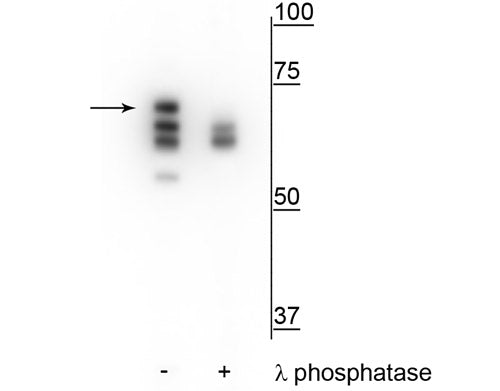Anti-Hsp70 (Ser153) Antibody
Our Anti-Hsp70 (Ser153) rabbit polyclonal phosphospecific primary antibody from PhosphoSolutions is
- SPECIFICATION
- CITATIONS
- PROTOCOLS
- BACKGROUND

| Primary Accession | P0DMV8 |
|---|---|
| Host | Rabbit |
| Clonality | Polyclonal |
| Isotype | IgG |
| Calculated MW | 70052 Da |
| Gene ID | 3303;3304 |
|---|---|
| Other Names | DnaK type molecular chaperone HSP70 1 antibody, Epididymis secretory protein Li 103 antibody, FLJ54303 antibody, FLJ54370 antibody, FLJ54392 antibody, FLJ54408 antibody, FLJ75127 antibody, Heat shock 70 kDa protein 1 antibody, Heat shock 70 kDa protein 1/2 antibody, Heat shock 70 kDa protein 1A antibody, Heat shock 70 kDa protein 1A/1B antibody, Heat shock 70kDa protein 1B antibody, Heat shock induced protein antibody, HEL S 103 antibody, HSP70 1 antibody, HSP70 1A antibody, HSP70 1B antibody, HSP70 2 antibody, HSP70-1 antibody, HSP70-1/HSP70-2 antibody, HSP70-1A antibody, HSP70.1 antibody, HSP70.1/HSP70.2 antibody, HSP71_HUMAN antibody, HSP72 antibody, HSPA1 antibody, HSPA1A antibody, HSPA1B antibody |
| Target/Specificity | The Hsp70 family of heat shock proteins are considered stress-induced survival proteins as they are expressed when exposed to factors such as heat, hypoxia, oxidative stress, altered pH or by underlying factors like cancer (Daugaard et al. 2007). Hsp70 proteins are able to bind hydrophobic residues on misfolded proteins, thereby preventing their aggregation and thus serving important roles in protein homeostasis. To date, there have been 8 members of the family identified; the majority of which are found in the cytosol though some have specific function in tissue or an organelle (Murphy, 2013). Hsp70 has also been shown to play a major role in cancer; from tumor grade to prognosis, as well as chemotherapeutic drug resistance (Ciocca et al, 2005). There have been several phospho-serine and threonine sites identified within Hsp70, the role of each one has yet to be determined. |
| Format | Antigen Affinity Purified from Pooled Serum |
| Storage | Maintain refrigerated at 2-8°C for up to 6 months. For long term storage store at -20°C in small aliquots to prevent freeze-thaw cycles. |
| Precautions | Anti-Hsp70 (Ser153) Antibody is for research use only and not for use in diagnostic or therapeutic procedures. |
| Shipping | Blue Ice |

Thousands of laboratories across the world have published research that depended on the performance of antibodies from Abcepta to advance their research. Check out links to articles that cite our products in major peer-reviewed journals, organized by research category.
info@abcepta.com, and receive a free "I Love Antibodies" mug.
Provided below are standard protocols that you may find useful for product applications.
Background
The Hsp70 family of heat shock proteins are considered stress-induced survival proteins as they are expressed when exposed to factors such as heat, hypoxia, oxidative stress, altered pH or by underlying factors like cancer (Daugaard et al. 2007). Hsp70 proteins are able to bind hydrophobic residues on misfolded proteins, thereby preventing their aggregation and thus serving important roles in protein homeostasis. To date, there have been 8 members of the family identified; the majority of which are found in the cytosol though some have specific function in tissue or an organelle (Murphy, 2013). Hsp70 has also been shown to play a major role in cancer; from tumor grade to prognosis, as well as chemotherapeutic drug resistance (Ciocca et al, 2005). There have been several phospho-serine and threonine sites identified within Hsp70, the role of each one has yet to be determined.
If you have used an Abcepta product and would like to share how it has performed, please click on the "Submit Review" button and provide the requested information. Our staff will examine and post your review and contact you if needed.
If you have any additional inquiries please email technical services at tech@abcepta.com.













 Foundational characteristics of cancer include proliferation, angiogenesis, migration, evasion of apoptosis, and cellular immortality. Find key markers for these cellular processes and antibodies to detect them.
Foundational characteristics of cancer include proliferation, angiogenesis, migration, evasion of apoptosis, and cellular immortality. Find key markers for these cellular processes and antibodies to detect them. The SUMOplot™ Analysis Program predicts and scores sumoylation sites in your protein. SUMOylation is a post-translational modification involved in various cellular processes, such as nuclear-cytosolic transport, transcriptional regulation, apoptosis, protein stability, response to stress, and progression through the cell cycle.
The SUMOplot™ Analysis Program predicts and scores sumoylation sites in your protein. SUMOylation is a post-translational modification involved in various cellular processes, such as nuclear-cytosolic transport, transcriptional regulation, apoptosis, protein stability, response to stress, and progression through the cell cycle. The Autophagy Receptor Motif Plotter predicts and scores autophagy receptor binding sites in your protein. Identifying proteins connected to this pathway is critical to understanding the role of autophagy in physiological as well as pathological processes such as development, differentiation, neurodegenerative diseases, stress, infection, and cancer.
The Autophagy Receptor Motif Plotter predicts and scores autophagy receptor binding sites in your protein. Identifying proteins connected to this pathway is critical to understanding the role of autophagy in physiological as well as pathological processes such as development, differentiation, neurodegenerative diseases, stress, infection, and cancer.


